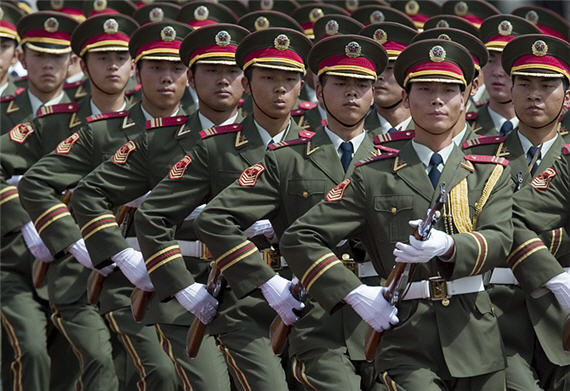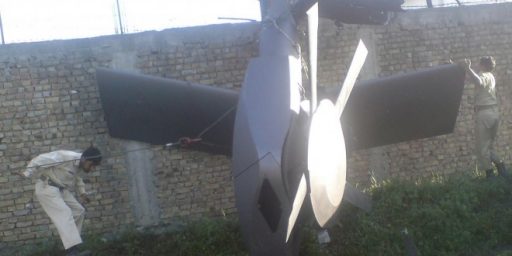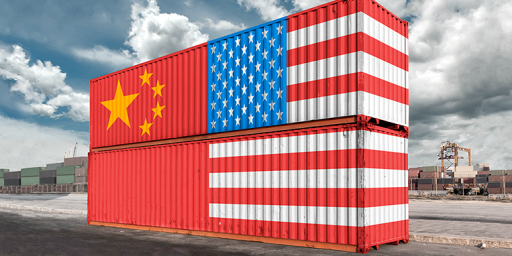China: Non-Existent Threat
For most of the post-Soviet era, American military planners have been searching for a peer competitor against which to base war planning and acquisition decisions. This is no easy task, in that there is no plausible scenario in which any state or likely group of states can match our ability to spend money. Regardless, “China!” is generally the chosen answer.
Defense Tech‘s Greg Grant recounts the latest instance of this in a post titled “Debating the Performance Characteristics of a Non-Existent Chinese 5th Gen Fighter.”
Today, the bean counting game is 5th generation fighters: how many we’ll have versus how many the Chinese will have. Of course all of this is based on some rather spurious projections because with our own constantly fluctuating Joint Strike Fighter program we don’t know for certain how many 5th gen fighters we’ll field in another decade, let alone how many the Chinese might be able to build.
We do know this: the number of 5th gen fighters in the Chinese inventory is zero.
U.S. aircraft manufacturers have wrestled with the complicated components of stealth, such as radar absorbent coatings and the complexities of the aircraft’s shape, for many decades. The F-22 program began in the 1980s; it was given Milestone I approval in 1986.
Yet, some assume China is on the cusp of mastering the complexities of stealth on an industrial scale. A recent Reuters story breathlessly claimed that China is developing a 5th generation fighter that “may rival within eight years Lockheed Martin Corp’s F-22 Raptor, the premier U.S. fighter.”
The problem with this is that, well, virtually no one believes this to be the case. Including the SECDEF.
Defense analyst and consultant Loren Thompson penned a recent piece in The Diplomat saying China is a long way from fielding an F-22 equivalent. “Not only does China lack the necessary experience or expertise in a number of relevant technologies, but it has never demonstrated the system-integration skills required to bring all those technologies together in a functioning airframe.”
But, damn it, we should buy us a bunch of really expensive planes, anyway, in case China’s acquisitions cycle explodes geometrically. And a plausible scenario develops in which even a militarily powerful China would have an interest in military confrontation with their most important trading partner.







Rationally we should cut way back on how much we actually spend to buy weapon systems for wars we aren’t going to have but maintain substantial research into future weapons technologies for wars we someday might…
Spending stupid amounts o money now on buy weapons makes no sense and only leaves us tempted to endless interfere in world events (and to be expected to shoulder this burden by our allies). At the same time the advantages of research 9both to outr military and the trickle down to the civilian population) are well worth the (much smaller) investment.
Short version- more labs and fewer factories.
J-Dawg, A suggestion for the new site design: I’d like to see the author of the lead post be listed on the frontpage.
A rather large chunk of my military students are convinced that China is a looming juggernaut. They also tend to think that Hugo Chavez is a major regional threat.
sigh.
I agree with the first comment above. I’m all for keeping our military at the technological cutting edge, as well as for maintaining a high level of preparedness for those “what-if” scenarios. But creating potential enemies out of militaries that are in no sense our equal seems to me to be self-defeating. The countries most able (and least willing) to challenge us in that arena are our traditional allies: the U.K., France, & Turkey (the only ones, I might add, who have maintained a modern military since the end of the Cold War).
Definitely coming. The omission is a result of the evolution of what that first slot was going to be. For a variety of reasons, it went from being a “featured post” into just the most recent non-quickie post.
The 3.1 version will be coming out in a couple of weeks, incorporating several tweaks, including this one. Aaron had to get this done before another project and a move to Austin. He’s now getting settled in and will be merging the OTB Media family of sites over the weekend and then moving on to these tweaks.
Thank God for spreading Christianity, freedom, and capitalism, and, the fact that their citizens are not completely brain washed anymore.
lol, unlike this comtry.
Our current defense posture is based on facing a high-tech near peer adversary Unfortunately, there are no candidates on the horizon for a high-test near peer adversary. A lot of general officers have based their careers on that.
@Drew
But the rub is our being on the “techonological cutting edge” has to be defined as putting us at better than parity with some (hypothetical) antagonistic peer. Who’s that gonna be? The only candidate is China. You’d never get the massive funding through Congress without some boogyman out there to incite the fears and passions. Looking around, China’s the only possible candidate nowadays (although the keyboard warriors over at NRO ocassionally plump for a reenergized Russia, or in a pinch, the Caliphate).
They’ve got more coal mines that we do, too. And as Gen.Turgidson argued, we can’t let them open a mine shaft gap!!
Sooooo… let’s wait until we need them before we start figuring our how to make them? By this token, Microsoft should have waited until there was a huge demand for personal PCs to design the Windows OS. National security is an ever-changing and competitive field, just like business. Only the downside of your competition getting the edge is much, much more personal.
I really think this whole issue ties into the “sphere of influence” thing that one side of the discussion feels is completely unnecessary, while other side (like myself) feels is part of keeping the wolf ,not only away from the door, but also continually reminds the wolf that it wouldn’t be smart to mess with the boss.
“Not only does China lack the necessary experience or expertise in a number of relevant technologies, but it has never demonstrated the system-integration skills required to bring all those technologies together in a functioning airframe.â€
Really? This is considered sophisticated defense analysis. Boil this down and all that’s being said is that China can’t do this because it’s never done this before. This is usually how things work – you can’t build a nuclear bomb because you’ve never done it before, until that is, you’ve done it, and then the previous analysis is pretty worthless.
Why not take a look at China’s ability to progress up the production ladder and if they’ve leapfrogged through some stages? Why not look at their military modernization efforts in other areas and see whether they’ve leapfrogged there as well? Why not look at whether China has introduced any industrial sectors into their economy from scratch?
If there is a record of failure in Chinese efforts to rush through industrial development stages, then the analyst can offer more support for the time-line argument. However, if China does have a record of success in leap-frogging development stages then that should be noteworthy. But hey, that’s just the way I see things. I’m no defense analyst.
No, we should buy some top-of-the-line fighters (particularly naval fighters that can be launched off carrier decks) so as to discourage even challenging our fighters in the air. That was one of the benefits of having the F-15s and F-16s back in the 1980s and 1990s – there were a number of potential enemies who had fighter jets of their own, but ours were simply so dominant that they didn’t even bother sending them out against us 99% of the time.
Besides, even if the Chinese aren’t making one themselves, there’s always the possibility that they’ll buy a 5th generation fighter (or even one of the “4.5” generation ones in development) from someone else (such as the Russians and Sukhoi, and the like).
Did Taiwan sink into the sea lately, and I didn’t hear about it? All it would take would be another Chen Shui-Bian equivalent taking it too far – declaring Taiwan independent – and you’d have an instant conflict between China and the US (which is guaranteeing Taiwanese security).
It’s good to see you listing Important Trading Relationships as a reason as to why a military confrontation will probably not occur, James. Norman Angell would approve.
And how do you propose to do that without actually keeping a decent stock of the equipment you’re exploring and designing? This isn’t World War 2 America anymore – we can’t just spam out a million tanks if a big conflict comes by. It takes years just to get the production lines set up for the high-tech modern stuff, and even longer if you only have prototypes, or some of the key components (particularly electronics) aren’t available in the numbers you want.
Besides, the aerospace companies aren’t going to spend their time and money developing prototypes with little chance of being built. Look at the F-22 – once the number of planes being bought dropped too low, the company more or less said that it was too costly to even keep the production lines open for spare parts.
@Brett
But that makes it appear as if we’re in an arms race with ourselves.
It is far far better to have the stuff we need and not need it then it is to need the stuff and not have it. There will be a looming conflict with China over Taiwan. When they think they are strong enough or we are weak enough they will attempt to annex a free people into their society through force.
It’s the economy ,stupid.For how long can the US spend trillions on defence with a massive deficit?
If the Taiwanese were stupid to declare independence all bets are off. Publicly the US says it does not support and oppose independence for Taiwan. You never know.History is full of examples of treachery eg Munich/stalin and hitler/nato expansion eastwards.The thing is you must be strong.
If the Chinese can send someone into space,what is there to stop them from developing the latest
jet/weapon system. You must remember the Chinese have been bedevilled with many problems from the opium war right up the to the latter part of the 20th century.
The best time for the US to stop China from posing a security threat to the US and not to Asia is now.Actually the price for defeating China has gone up from the mid 50s to the early part of the 21st century.It will continue to increase with the march of time.
The PLA will develop the means to deter the US. if the US can deter China,why can’t the PLA?
In other words the US can be atthreat to China’s security but not vice versa. You can’t have the cake and eat it.